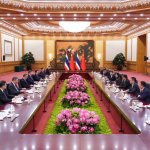
When Thailand’s Prime Minister Prayut Chan-o-cha decided to opt out of the ASEAN Summit on Myanmar in Jakarta, perhaps the writing was on the wall. By sending Foreign Minister and Deputy Prime Minister Don Pramudwinai in place of Prayut, Thailand appeared to have forfeited the chance to steer any of the potential outcomes of the gathering, which seeks to find diplomatic and political solutions to the crisis in Myanmar, which has claimed more than 730 lives since the Tatmadaw launched a coup d’état on February 1.
There are two very different ways of looking at this development.

The pessimistic and negative assumption is that Thailand does not believe that a significant outcome will be achieved by the Summit in Jakarta and has deferred to the foreign minister as an element of pragmatism. After all, the relationships built between Thailand’s military-backed government and the Tatmadaw is one based on personality, evidenced by earlier high-level talks between Prayut and coup leader—even leading to awarding Senior General Min Aung Hlaing in February 2018, the Knight Grand Cross of the Most Exalted Order of the White Elephant.
On the other hand, quiet diplomacy might be Thailand’s objective, because of the intimacy shared by their respective militaries and continued friendly relations between the two countries. Thailand has been slow to judge or alienate the junta leaders, speaking only for the need to enhance regional “peace, stability, and security” a rhetorical line that has been repeated by ASEAN diplomats in the past covering a variety of regional crises.
With trust building completed and a friendship cultivated, diplomats like Thai Foreign Minister Don Pramudwinai feel confident enough to play a role as a mediator in a sensitive situation, particularly because of his history and personal rapport with his counterpart, Wunna Maung Lwin.
The question, given the short amount of time until the Jakarta summit and Bangkok’s lack of public pressure, is whether Thailand can impress upon the Tatmadaw and help stop the crisis that has led to violence, repression, and the deaths of hundreds. Thailand has much to lose if what was once an internal matter continues to spill across borders including into India and Bangladesh.
An ASEAN-wide solution wasn’t in Thailand’s plans during the 2017 Rohingya crisis, where the junta preferred to maintain the ASEAN’s tired principle of non-interference rather than play a key humanitarian and regional leadership role. Thailand also risks turning Myanmar’s “marketplaces” back into battlefields, as Myanmar’s economy appears on the verge of collapse. An economy that averaged more than 6 percent growth over the past decade is now projected by the World Bank to shrink by more than 10 percent in 2021. While China, India and other regional powers have larger economic stakes in Myanmar, Thailand still is one of the biggest investors in Myanmar, with billions in foreign direct investment.
However, politically, Thailand is in a bind. It’s no secret that Myanmar has been using the Thai junta’s tried and true approach to repression. On February 1, the Tatmadaw cracked down on civil society, the free press, and placed severe curbs on mass mobilization—similar to what Prayut did in May of 2014. Thailand’s repression of opposition political parties has given (or Min Aung Hlaing license to target the National League for Democracy (NLD), and the same goes for crackdowns on public protest—with the lone exception the Tatmadaw’s penchant for lethal uses of force. Therefore, it is hypocritical for Thailand to suggest Naypyidaw reverse course or open itself up for dialogue with ASEAN.
The ASEAN summit in Jakarta will be a test of the bloc’s resolve and of its non-interference policy and another test of its politics. ASEAN was terrible at trying to achieve consensus during the South China Sea dispute, and even further back it couldn’t present much of a united front after the September 11 terrorist attacks in the United States. Now, faced with a crisis with one of its own, it must find a way to resolve a sovereignty issue and a legitimacy issue with a hostile military junta that has the political leverage and the resolve to resist any political settlement.
Thailand, arguably with the most to lose if Myanmar’s crisis spills beyond its borders still has a role to play. Thailand and India fear an influx of refugees pouring across key borders, but the Thai military could still use its influence with the Tatmadaw to compromise on humanitarian grounds, particularly because of the sheer number of people internally displaced—250,000 as of last count. Thailand could be more accommodating in agreeing to host refugees and asylum seekers, something recently it failed to do.
Prayut has through the past several years given Myanmar’s generals a roadmap to power and a veneer of legitimacy, made all the more obvious by ASEAN’s recent extension of an invitation to the Jakarta summit. Thailand is relying on its history of past diplomacy and stored credibility with Min Aung Hlaing to bring about some kind of precarious solution. To play a more serious role within ASEAN, it must summon the courage to unify the ASEAN bloc to not treat the coup in Myanmar as an internal matter, but as a regional problem.






